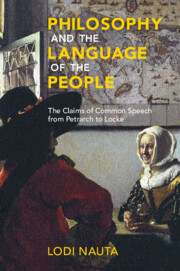Book contents
- Philosophy and the Language of the People
- Philosophy and the Language of the People
- Copyright page
- Contents
- Acknowledgments
- Introduction
- Chapter 1 Early Humanist Critics of Scholastic Language: Francesco Petrarch and Leonardo Bruni
- Chapter 2 From a Linguistic Point of View: Lorenzo Valla’s Critique of Aristotelian-Scholastic Philosophy
- Chapter 3 Giovanni Pontano on Language, Meaning, and Grammar
- Chapter 4 Juan Luis Vives on Language, Knowledge, and the Topics
- Chapter 5 Anti-Essentialism and the Rhetoricization of Knowledge: Mario Nizolio’s Humanist Attack on Universals
- Chapter 6 Skepticism and the Critique of Language in Francisco Sanches
- Chapter 7 Thomas Hobbes and the Rhetoric of Common Language
- Chapter 8 Between Private Signification and Common Use: Locke on Ideas, Words, and the Social Dimension of Language
- Conclusion
- Bibliography
- Index
Conclusion
Published online by Cambridge University Press: 13 July 2021
- Philosophy and the Language of the People
- Philosophy and the Language of the People
- Copyright page
- Contents
- Acknowledgments
- Introduction
- Chapter 1 Early Humanist Critics of Scholastic Language: Francesco Petrarch and Leonardo Bruni
- Chapter 2 From a Linguistic Point of View: Lorenzo Valla’s Critique of Aristotelian-Scholastic Philosophy
- Chapter 3 Giovanni Pontano on Language, Meaning, and Grammar
- Chapter 4 Juan Luis Vives on Language, Knowledge, and the Topics
- Chapter 5 Anti-Essentialism and the Rhetoricization of Knowledge: Mario Nizolio’s Humanist Attack on Universals
- Chapter 6 Skepticism and the Critique of Language in Francisco Sanches
- Chapter 7 Thomas Hobbes and the Rhetoric of Common Language
- Chapter 8 Between Private Signification and Common Use: Locke on Ideas, Words, and the Social Dimension of Language
- Conclusion
- Bibliography
- Index
Summary
Though this book has studied only a limited set of authors and texts in considerable detail, some general conclusions may be drawn. First, we may note the historical continuity of the critique of scholastic language from the early days of humanism to the end of the seventeenth century. When Leibniz, for instance, praised Nizolio for his rejection of abstract terminology, he quoted an old dictum that had been made popular by his humanist sources: “Der Gebrauch ist der Meister”, endorsing the humanistic point that philosophical language should follow the common language of the people: the “passion for devising abstract words has almost obfuscated philosophy for us entirely.” Similarly, Gassendi was quite explicit about his debt to humanists, mentioning Vives, Charron, Ramus, and Gianfrancesco Pico, and referring to Valla’s program of ontological reduction in his own rejection of what he considered to be the useless superstructure of the scholastic conceptual armory: scholars should use “the common and accepted manner of speaking (communis et protritus loquendi usus).”
- Type
- Chapter
- Information
- Philosophy and the Language of the PeopleThe Claims of Common Speech from Petrarch to Locke, pp. 245 - 251Publisher: Cambridge University PressPrint publication year: 2021

